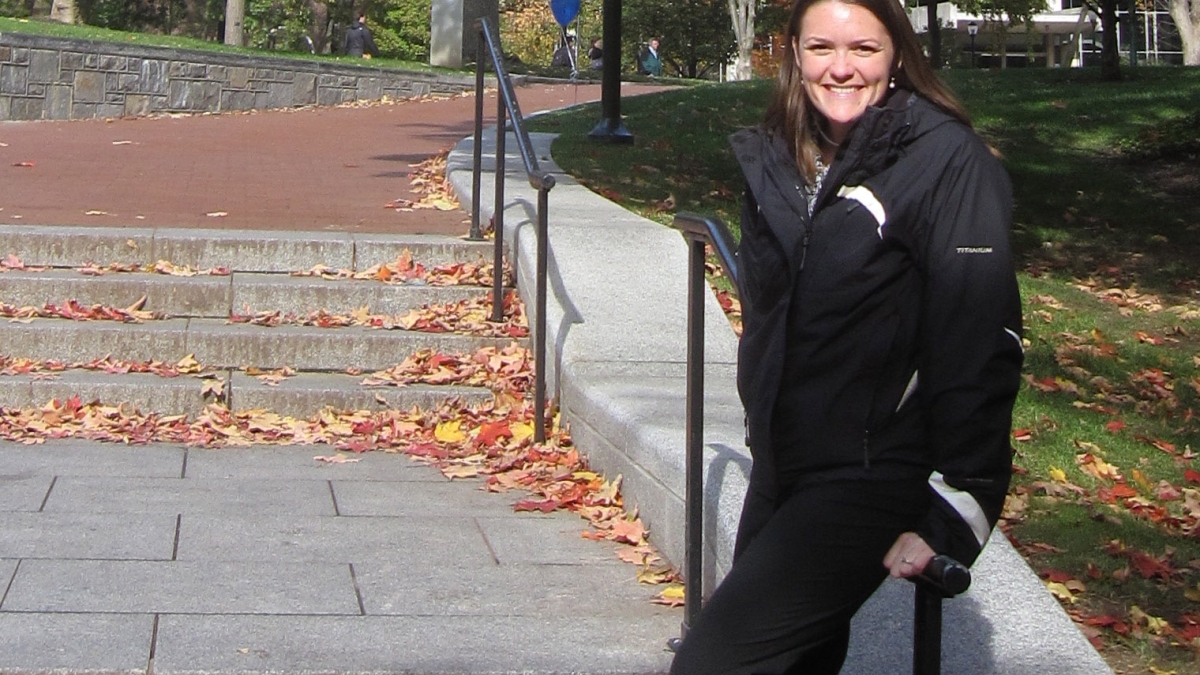Student meets noted scholars at Philadelphia conference

For Lauren Chamberlain, a student in ASU’s master of arts program in social justice and human rights (MASJHR), traveling to a Philadelphia conference meant she had the opportunity to incorporate quotes from human rights icon Angela Davis into a presentation she made at the conference. But the Angela Davis connection didn’t stop there; Chamberlain also had the opportunity to hear Davis speak and engage in a dialogue with audience members in a small-group setting.
Chamberlain was among a group of graduate students who joined faculty member Julie Murphy Erfani in attending the Critical Refusals Conference at the University of Pennsylvania. The conference was organized by the International Herbert Marcuse Society.
The MASJHR program is offered by ASU’s New College of Interdisciplinary Arts and Sciences, the core college on the West campus. Murphy Erfani is an associate professor in New College’s School of Social and Behavioral Sciences.
“It was a great opportunity for the students to hear diverse perspectives on a range of topics and to interact with scholars from around the country,” said Murphy Erfani, who organized the panel presentation “Refusing Proto-totalitarianism: Critical Theory and Human Rights Abuses in Arizona and Beyond,” in which the students participated. “By taking part in the panel, they also had the chance to sharpen their presentation skills and receive feedback about their work.”
Chamberlain’s presentation focused on medical negligence in U.S. immigrant detention centers. It was the subject of a study she completed in an MASJHR class, Problem-Based Seminar, taught by Erfani.
A 2004 graduate of U.C. Berkeley, Chamberlain entered the MASJHR program after spending six years as an elementary school educator at Laveen Elementary School and Valley View School, teaching kindergarten, first grade, and K-8 behavior intervention. She is pursuing the New College master’s degree as a means to reach her goal of entering a nonprofit career in youth violence prevention, with an overall goal of building safer, more inclusive communities through youth empowerment, leadership development and conflict resolution training.
Chamberlain took part in an internship with Search For Common Ground, an international conflict transformation organization that works in 29 countries around the world. She says the issues that interest her most include peace education, violence prevention, and immigrants’ rights. It’s that last topic that was the subject of her presentation in Philadelphia, “Silenced At Any Cost: Systematic Medical Negligence in United States Immigrant Detention Centers.”
Chamberlain’s presentation included startling statistics, including the fact that suicide is the most common cause of death among detainees. She detailed three examples of immigrant detainee deaths resulting from inadequate health care. Key issues contributing to medical neglect in detention centers, she said, are a 2010 Supreme Court decision leaving immigrants in detention centers with no legal recourse when they are denied proper care, and the enactment of Arizona’s SB 1070 statue, which criminalizes migrants, making denial of their rights socially acceptable. Another factor is the trend toward housing detainees in privately managed detention facilities, where denial of appropriate medical coverage may serve as part of cost-saving strategies.
Chamberlain also pointed out that the detention of immigrants and asylum seekers is, at least in theory, considered administrative detention, not imprisonment. The systematic medical negligence found in detention centers highlights the need for alternatives to detention, she said. Chamberlain pointed to humane alternatives that cost a small fraction of the expense of placing people in detention facilities. Programs that emphasize case management and legal services for undocumented immigrants show high compliance rates without detention or electronic monitoring, she concluded.
“Lauren’s presentation was very well-received by attendees at the conference,” Murphy Erfani said. “Participation in conferences of such high academic quality by our social sciences students showcases their extraordinary accomplishments.”
Another MASJHR student, Michihiro (Clark) Sugata, also made a presentation as part of the panel. He now is a Ph.D. student at ASU’s Tempe campus.
From Chamberlain’s perspective, the conference was a great opportunity to gain exposure to a wide range of philosophies. “It was fascinating to hear how scholars from around the world are applying the theories of Marcuse, Freud and others to contemporary social issues,” she said. “I enjoyed the process of preparing my presentation and integrating the works of Marcuse and Angela Davis into my work on medical negligence in immigrant detention, and felt that my own presentation went over quite well.
“The highlight for me was, without a doubt, hearing Angela Davis and scholar Eric Stanley converse on ‘Queer Politics and Prison Abolition.’ The smaller setting of the conversation, with approximately 60 people, allowed the audience to ask a number of questions and to engage in dialogue with these incredible scholars.”
“Not only did attending the conference give the students the chance to grow intellectually and interact with renowned scholars, but it also helped spread the word about New College and the MASJHR program,” Murphy Erfani said. “People from institutions across the United States were exposed to the excellent work our students are doing.”
“The effort Dr. Murphy Erfani put into organizing the panel and encouraging students to participate is indicative of the commitment of SBS faculty to promote student scholarship,” said Carol Mueller, director of the . “We have a number of students engaged in outstanding research activities and faculty members who are willing to devote the required time and effort to support those students in their efforts.”